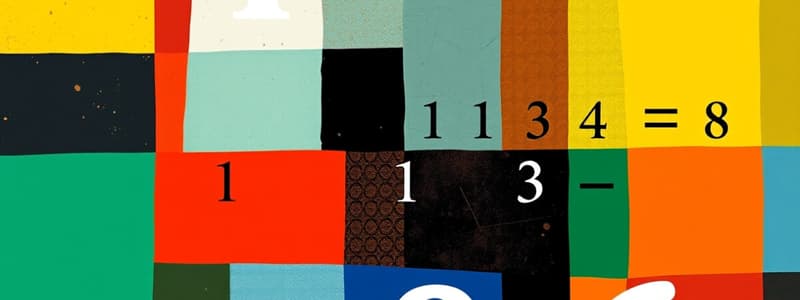Podcast
Questions and Answers
What is an arithmetic sequence?
What is an arithmetic sequence?
- A sequence with random values
- A sequence formed by multiplying each term by a fixed number
- A sequence that contains only prime numbers
- A sequence formed by adding a fixed number to each previous term (correct)
What is the common difference in an arithmetic sequence?
What is the common difference in an arithmetic sequence?
The difference between consecutive terms
Which of the following describes a continuous graph?
Which of the following describes a continuous graph?
- A graph that is unbroken (correct)
- A graph composed of isolated points
- A graph that includes only integers
- None of the above
What is a dependent variable?
What is a dependent variable?
What characterizes a discrete graph?
What characterizes a discrete graph?
What is the domain in mathematics?
What is the domain in mathematics?
Define a function.
Define a function.
What is function notation?
What is function notation?
What is an independent variable?
What is an independent variable?
What does input refer to in a function?
What does input refer to in a function?
What is a linear function?
What is a linear function?
Define a nonlinear function.
Define a nonlinear function.
What does output refer to in a function?
What does output refer to in a function?
What is the range in mathematics?
What is the range in mathematics?
Define a relation.
Define a relation.
What is a sequence?
What is a sequence?
What is a term of a sequence?
What is a term of a sequence?
What is the vertical line test used for?
What is the vertical line test used for?
Flashcards are hidden until you start studying
Study Notes
Key Concepts in Algebra
-
Arithmetic Sequence: A sequence formed by adding a constant value (common difference) to each previous term to generate the next term.
-
Common Difference: The fixed difference between consecutive terms in an arithmetic sequence, essential for determining the next term in the sequence.
-
Continuous Graph: A type of graph that remains unbroken, representing smooth transitions between points.
-
Dependent Variable: Represents the output values in a function; its value is dependent on the input provided by the independent variable.
-
Discrete Graph: Composed of isolated points, contrasting with continuous graphs; often represents data that are not connected.
-
Domain: The complete set of possible input values (independent variable values) for a relation or function, crucial for understanding restrictions on inputs.
-
Function: Defines a relation that assigns exactly one output (dependent variable) for each input (independent variable), ensuring a unique mapping.
-
Function Notation: Standard way to express functions, typically in the format f(x) instead of using Y; simplifies communication of functions.
-
Independent Variable: The input variable of a function that determines the output value; its changes directly affect the dependent variable.
-
Input: Refers to the specific value of the independent variable fed into a function to produce an output.
-
Linear Function: A particular type of function whose graph yields a straight line; characterized by a constant rate of change.
-
Nonlinear Function: A function whose graph is not a straight line, displaying varying rates of change; often includes quadratics, exponentials, etc.
-
Output: The value produced by the function for a given input; corresponds to the dependent variable.
-
Range: Represents the set of all possible output values for a relation, providing insights into the function's behavior.
-
Relation: Refers to any collection of ordered pairs; can represent various relationships between quantities.
-
Sequence: An ordered list of numbers often following a specific pattern, integral for understanding progression in mathematics.
-
Term of Sequence: Any individual number within a sequence, contributing to the overall pattern.
-
Vertical Line Test: A technique utilized to determine if a graph represents a function; if a vertical line intersects the graph at more than one point, the relation is not a function.
Studying That Suits You
Use AI to generate personalized quizzes and flashcards to suit your learning preferences.




